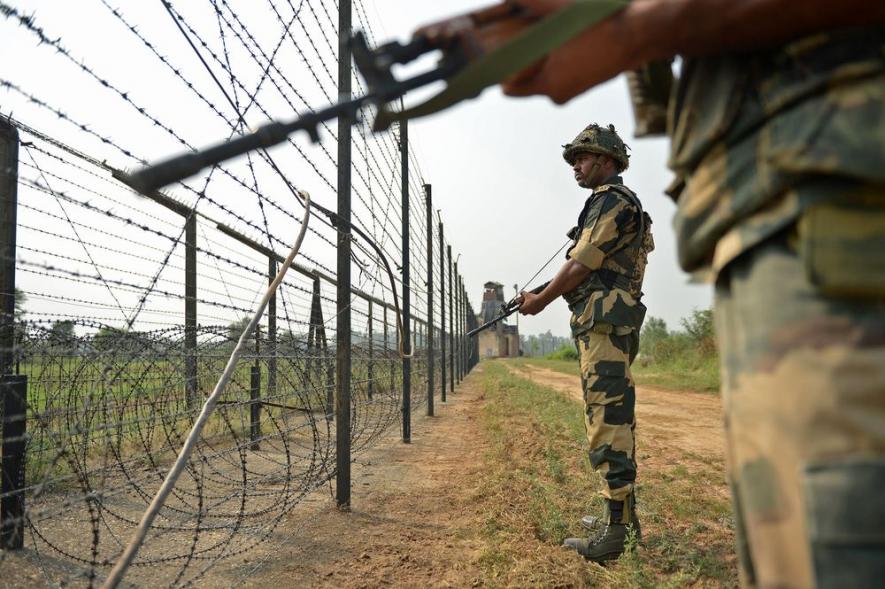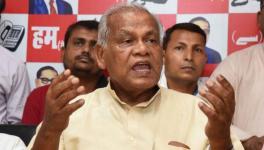National Security: When Rhetoric Takes Over

Image courtesy: Bloomberg
As we near the end of the election campaign for the 17th Lok Sabha, it becomes apparent that although national security is the leit motif in these elections — insofar as the Bhartiya Janata Party (BJP) is concerned — it only amounts to a rhetoric-based approach to make the ‘great leader’ appear tough. It remains devoid of substantive issues and the seriousness that it deserves.
For this, both the ruling party and the opposition must share the blame.
There are three sets of issues that needed to be deliberated upon — the utter failure in having averted the Pulwama suicide attack, the staging of the Balakot air attack on February 26 that has upped the ante for future response and the swift response by Pakistan Air Force on February 27 catching India by surprise. All of these should have been raised and discussed, and debated at the least.
Especially when the ruling party was going gung-ho over “having-taught-Pakistan-a-lesson” line. By far, the biggest issue of all was the elevation of the listing of Masood Azhar as a “global terrorist”, a mere, and obviously, symbolic act, as a pinnacle of India’s politico-military achievement. In achieving this with the help of the US, the Modi sarkar has been cornered by the Trump administration to now surrender to its diktat to cut all oil supplies from Iran, sacrifice its much-touted plans for using Chabahar port for trade with Afghanistan, Central Asia and key to its International North-South Corridor to become part of the Eurasian growth story.
Also read: National Security: The New in ‘New Normal’
So, in order to score brownie points, with the elections in mind, the Modi Sarkar staked its all to get a single person listed, all the while remaining unmindful of the price the country would eventually have to pay in terms of buying more expensive oil from elsewhere, including from US, and having to jeopardise its grandiose plans for providing India with transit routes to realise its ambitious plans for Eurasia.
The ramifications of such a foolhardy decision don’t stop here. It also means that India’s tilt towards the US appears complete, thereby compromising on strategic autonomy and independent foreign policy. There is some reason to believe that India’s decision to buy S400 missiles from Russia may either be trumped by another US sanction regime, CAATSA, or India would be compelled to placate the US by buying US armaments accompanied by deep cuts into other military purchases from Russia.
Arguably, the meek surrender to unilateral US sanction regime by a so-called “strong and decisive” government became inevitable because India’s obsession with Pakistan and the exaggerated sense of threat it poses has historically clouded good sense. Restraint and patience occupy no place in the BJP’s lexicon. In contemporary India, strength is equated with display of physical prowess. Muscularity displayed by Pakistan for all of seven decades has made them hollow, dependent on foreign aid, with little room for manoeuvring. A Right-wing-led muscularity has gripped India and we appear quite enamoured of the same path to emulate.
The other area is India’s use of its military might against our its own people. There is utter lack of appreciation of the fact that fighting prolonged wars at home for decades makes India vulnerable if not hollows out India’s armed forces. This, in turn, makes them less and less capable of carrying out their primary task of defending the country from external threat. So we have enough material and human resources to waste on fighting wars at home. But not enough to equip our armed forces or to even pay for One Rank One Pension. All this is possible because successive Indian governments have invested heavily in building the narrative of “proxy war”.
Also read: Taking Another Hard Look at National Security
Indeed there is an incongruity over this issue. If indeed Pakistan and China are adversaries and pose a security threat, one would expect that we resolve our problems at home politically in order to ensure that the armed forces are not distracted from their primary role. Instead, by refusing to resolve them by any other but the military way, we are committing a grievous error.
Take the Maoist guerilla war. A former director of Centre for Land and Warfare Studies (CLAWS), Major General Dhruv Katoch, had once written in 2015 that too much is made out of the weapons the guerillas possess and pointed out that they are low on ammunition and incapable of fighting a sustainable battle. He then wrote that they have an assortment of weapons, some of which are same as with the forces and the rest “infinitely poorer”. Yet, if they have not been defeated, it means that these poorly armed guerillas do enjoy some support, or else a superior force could have finished them by now. A national seminar held last November by CLAWS claimed that the government has been successful in reducing the area of their influence from 223 districts to 90 districts. While it admitted that the guerillas have the “capacity to launch attacks”, it observed the “disparity in the distribution of wealth within the country” and advocated that the country address the “root cause” as to why they still enjoy support.
In fact, it is interesting that the draft report submitted by Lt General (retd) DS Hooda too spoke along the same lines and fleshed it out a little more by pointing to the deep anguish of the adivasis at being displaced from their forest abode and the manner in which their land and habitat was being overtaken by mining and other corporations. Now this is sensible advice. It is an axiomatic truth that one way of ending a problem is to address the underlying cause, which will incapacitate the reason for war. How come such a sensible approach advocated by a high-powered military think-tank or military officers finds such few takers? It’s worth recalling that wars are waged because of failure of politics, if not lack of imagination.
Take another issue, the unresolved Naga question. Lt General (retd) Rameshwar Roy wrote sometime last year in CLAWS Journal [Naga Peace Accord: Dilemma for the Rest of India’s North East, Summer 2018] that successive governments have tried to buy time and tire out the various factions of the Naga movement. Why? Because, he wrote, the government had no long-term vision to delve into this issue. Moreover, he wrote, all governments have attempted to solve the problem in isolation, taking one North Eastern state at a time, not realising that they are all linked. Yet again there are no takers for this wise approach.
Lastly, a critical part of India’s national security has to do with weaning the country away from dependence on military imports. Former naval chief Arun Prakash has been repeatedly writing about the danger of our dependence on imported military hardware. If the answer to this is ‘Make in India’ policy of the Modi Sarkar, then it is like moving from one pit hole to another. Indeed, it can be reasonably argued that envisioning a reduction of India’s dependence on imported military hardware by making India dependent on military hardware production by foreign Original Equipment Manufacturers in India, it means we are doomed.
Barring the Soviet Union, which shared its military technology with India, no foreign OEM has ever shown willingness to part with their ownership of critical parts of the technology.
US-based OEMs are on record stating this and have repeatedly stated that they will not part with their ownership and control. Apart from all this, India, which is resource poor, can ill-afford to have these foreign OEM-controlled production units that must be guaranteed regular orders and a lucrative return on their investment.
With the BJP claiming that the Rafale deal was cut down from 126 to 36 fighter jets for want of funds, from where is the money going to come to pay for these white elephants? If the government really cared for national security, they would have devoted time and resources on reforming the publicly-owned defence sector, where scarce resources are already invested, rather than looking for ways to enrich their cronies or benefit foreign OEMs.
Also read: Rafale Deal: National Security Cannot Prevent Pursuit of Truth
It is this that lies behind the frequently appearing stories which point at the failure of the public sector defence units to provide quality military hardware and ammunition. Instead of rectifying the problems by focusing on reform, the tendency is to damn the public sector and pave the way for its privatisation. If privatisation was such a boon then the Anil Ambani-owned naval shipyard in Pipavav port would not be such a colossal failure.
The point is that there are innumerable issues where national security is of concern. And they all deserve to be raised and discussed in public.
Instead, the Indian public is served inanities and rhetoric, because rulers know their lackeys will provide us the usual dose of the “hate-Pakistan-fear-China-ally-with-US”.
No wonder, in this election, the rhetoric and bogey of “teaching-Pakistan-a-lesson” has prevailed over everything else. This makes India a giant with feet of clay.
Get the latest reports & analysis with people's perspective on Protests, movements & deep analytical videos, discussions of the current affairs in your Telegram app. Subscribe to NewsClick's Telegram channel & get Real-Time updates on stories, as they get published on our website.
























